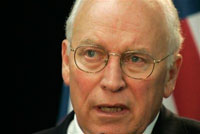Dick Cheney should slam himself, not Russia
Demonstrating Washington's support for war-ravaged Georgia, U.S. Vice President Dick Cheney condemned Russia for what he called an "illegitimate, unilateral attempt" to redraw this U.S. ally's borders by force.

Speaking during a closely watched trip to this strategic South Caucasus nation, Cheney also said the United States was "fully committed" to Georgian efforts to join NATO.
"Georgia will be in our alliance," Cheney told reporters while standing alongside Georgian President Mikhail Saakashvili.
One of the U.S. administration's most hawkish figures and a longtime critic of Russia, Cheney was visiting Georgia and two other ex-Soviet republics - Azerbaijan and Ukraine - that are nervous about Moscow's intentions.
The trip signaled to Moscow that the United States will continue cultivating close ties with Georgia and its neighbors even after Russia showed it was willing to use military force against countries along its border.
"America will do its duty to work with the governments of Georgia and our other friends and allies to protect our common interests and to uphold our values," Cheney said in the joint appearance with Saakashvili.
"Russia's actions have cast grave doubts on Russia's intentions and on its reliability as an international partner," he added.
Since the war in Georgia last month, Russia has boldly asserted it has what President Dmitry Medvedev called "privileged interests" in its sphere of influence, which includes the former Soviet states in the South Caucasus.
The United States is at Georgia's side, Cheney said, "as you work to overcome an invasion of your sovereign territory and an illegitimate, unilateral attempt to change your country's borders by force, that has been universally condemned by the free world."
On the eve of his arrival, the White House announced a US$1 billion commitment to help the small but strategically located nation recover from its war with Russia.
Cheney also thanked Georgia for sending troops to Iraq. Georgia has been the third largest contributor of troops to the U.S.-led operation there.
"Now it is the responsibility of the free world to rally to the side of Georgia," the American vice president added.
Saakashvili said Georgia was committed to a peaceful resolution of its disputes with the breakaway regions of South Ossetia and Abkhazia. Russia, which has given military, political and financial support to the two areas, has recognized both as independent nations.
Saakashvili also said Georgia was grateful for theaid, which matched his government's estimate of war damages.
"Together with our other partners, in Europe, America and elsewhere, we will rebuild Georgia," Saakashvili said. "We feel that we are not alone."
Medvedev has called Saakashvili a "political corpse" and Moscow has urged an arms ban while he is still in power. Cheney, however, signaled Washington's continuing strong support.
"You have been fearless in response to the occupation of your country and steadfast in your principles. We respect you," Cheney told the Georgian president.
A day earlier, Cheney visited Azerbaijan, where a million-barrel-a-day pipeline runs from the Caspian Sea shores into Georgia and on into Turkey. The pipeline is the only direct route for Europe-bound Caspian oil to bypass Russia. Caspian oil also goes to Georgian ports by another pipeline and by rail.
Because of Cheney's itinerary, "we see this as a very clear sign that alternative energy routes and sources will be secured," Georgian national security council head Alexander Lomaia told The Associated Press.
The massive U.S. aid package was to be a major highlight of Cheney's meetings in Tbilisi, but he will likely leave unanswered the question of potential U.S. aid to rebuild Georgia's military.
Military aid from the United States and some Western European countries was key to transforming the Georgian army and navy from their ragged post-Soviet condition into a credible fighting force. Yet routed by Russian forces, the Georgian military will need more Western aid to rebuild if the country is to join NATO.
Angry Russian officials have repeatedly said U.S. military aid was instrumental in emboldening Georgia to try to retake South Ossetia by force on Aug. 7. The attack sparked five days of fighting and resulted in Russian forces driving into South Ossetia and on into Georgia.
New U.S. military aid to Georgia would further aggravate relations between Washington and Moscow, which are already at a post-Cold War low.
Russia has also condemned the U.S. use of warships to deliver aid as a form of gunboat diplomacy. The flagship of the U.S. 6th Fleet in the Mediterranean, the USS Mount Whitney, arrived in the Black Sea on Wednesday with a cargo of aid.
After spending several hours in Georgia, Cheney arrived in Ukraine, where he was expected to express support for its efforts to join NATO and integrate with the West.
His visit comes amid concerns the Kremlin might next target Ukraine as it tries to reclaim its dominance in former Soviet republics.
Subscribe to Pravda.Ru Telegram channel, Facebook, RSS!




